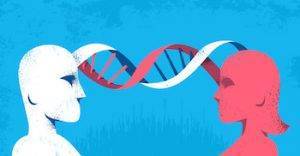
Genetics is one of those subjects that cause people’s eyes to quickly glaze over with boredom. Yet it is key to explaining why some people develop Autism Spectrum Disorder (ASD) and others don’t. Bear with me as I describe this connection.
Autism is considered a neurodevelopmental disorder. It originates in the brain or nervous system, it tends to show up early in life and it affects a person’s emotions, self-control, and social communication and social interaction.
So, if Autism is “hard-wired” in the brain at birth what makes the brain develop this particular way? Secondly, if people are born with ASD does that mean it’s passed along from relatives?
The answer to the first question appears to be genetic mutations. The answer to the second question is, Yes and No. Let me explain.
The Genetic Origin of Autism Spectrum Disorder
Researchers have identified about 100 genes that are implicated in autism, the basis of Autism Spectrum Disorder. This fact alone is important. It indicates that no one “Autism Spectrum Disorder gene” exists. People do not develop ASD because they have a gene, or even various genes, specific to this condition. Instead, many different genes, all undergoing various changes or mutations in the way their DNA is arranged, are necessary to create ASD.
This is not the final story, however. While mutations in the genes that lead to Autism Spectrum Disorder must first take place, the next crucial step involves these genes meeting at a particular cell type in a particular location in the brain at a particular time while the fetus is forming.
Apparently, all this happens with cells that have to do with communication within the brain and as consequence, the person develops deficits in verbal and non-verbal communication, the hallmark of Autism.
Here we have two surprising facts about the genetic basis of Autism Spectrum Disorder. First, there is no gene that causes this condition. Instead, many genes must undergo mutations in order for the proper conditions leading to Autism to be met. Second, these mutated genes must converge on specific cell types in certain areas in the brain having to do with communication, and this all must happen during the specific times that these communication areas are forming.
A Surprising Finding about Autism Spectrum Disorder
But there is a third surprising fact about the genetic basis of Autism Spectrum Disorder. The majority of mutated genes do not come from parents who themselves have ASD. Instead, mutations occur suddenly and unplanned in single sperm or egg cells just prior to conception of the child.
In other words, two parents who themselves do not have Autism Spectrum Disorder can produce a child with ASD by virtue of the fact that the parent’s sperm or egg cells produce genes that spontaneously undergo mutations specific to ASD.
How this can happen has yet to be discovered, but what we are left with is a rather remarkable process in which two parents, neither of whom has Autism Spectrum Disorder or whose relatives have ASD can produce a child with Autism.
Conclusion
It’s commonly believed that Autism Spectrum Disorder is not caused by faulty parenting, vaccines, mercury exposure, or other environmental conditions but by genetics.
In fact, studies of identical twins show that about 60% of the time, if one twin has Autism the other twin will as well, even if the twins were separated early in life and were not exposed to the same environmental influences. It is no wonder why genetics is thought to be the primary factor in ASD.
Unfortunately, the relationship between twins and Autism Spectrum Disorder has led to several erroneous conclusions. There is no single gene that causes Autism. Instead, many genes, all having some connection to areas in the brain having to do with communication, must independently undergo changes at the same time in order to ASD to occur. And, the cause of this are not “faulty” genes in the parents passed along to the child, but spontaneous mutations in sperm or egg cells just prior to conception of the child.
It seems science keeps finding surprising facts about Autism Spectrum Disorder all the time.
